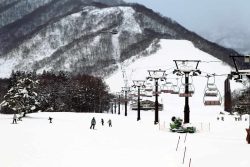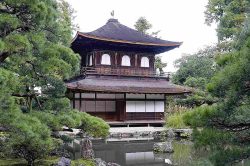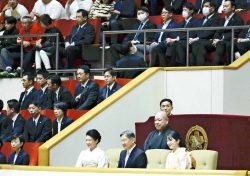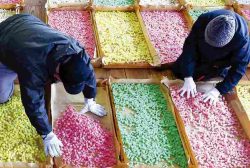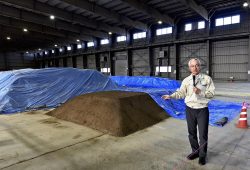‘Open-Air Book Shop’ Opens in Town Affected by Fukushima Nuclear Plant Disaster; Owner Hopes to See Area Rejuvenated
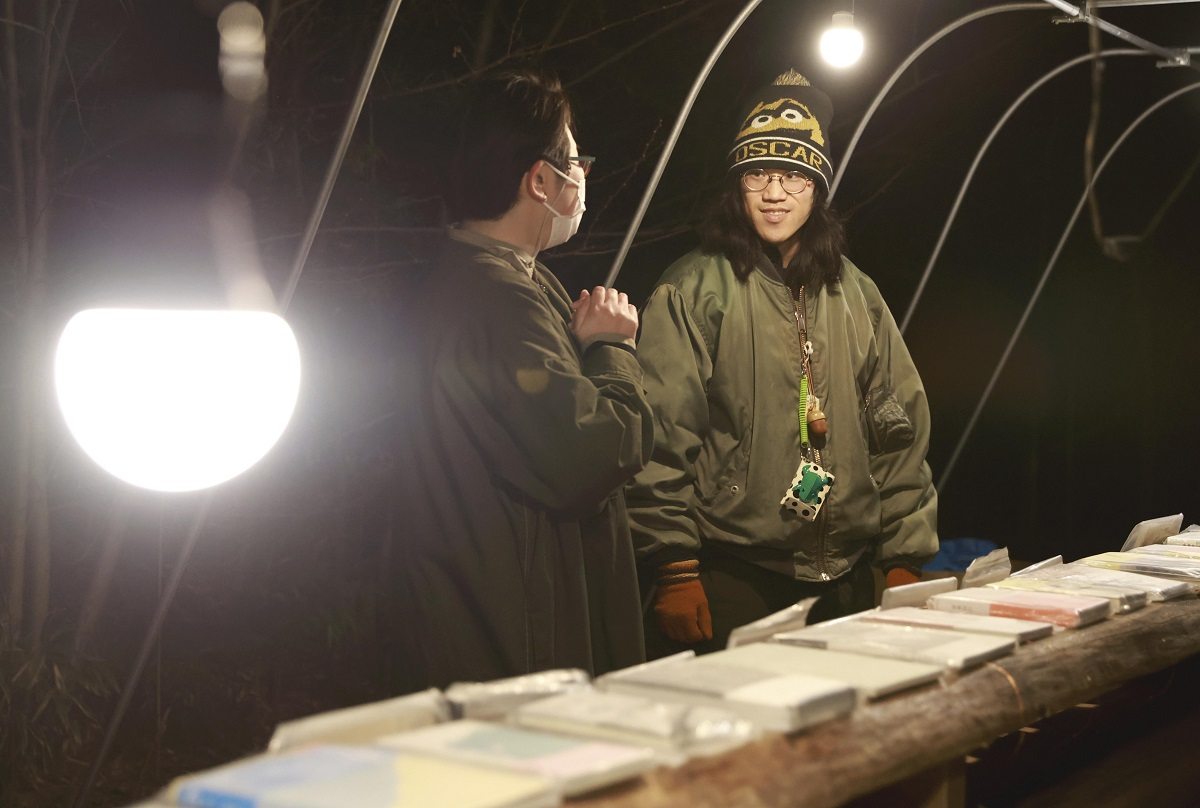
Yu Takeuchi, right, chats with a customer at his stall in Okuma, Fukushima Prefecture, on Feb. 24.
12:12 JST, March 11, 2024
OKUMA, Fukushima — In an area of rice fields where plots of land had been developed, many homes have been demolished and there were few signs of people. The area is located in Okuma, Fukushima Prefecture, which is home to the Fukushima No. 1 nuclear power plant.
Since December last year, a few lights have been gently illuminating a corner of vacant land located a short distance from Ono Station on the JR Joban Line.
The lights are part of a small book-reading stall set up by 25-year-old company employee Yu Takeuchi, who opens the stall for about three hours from 6 p.m. every evening except on Mondays. The stall is called Ikitsugi, which means “taking a breather.” The shop has no roof or walls, so it does not open if it rains or snows.
Bookshelves made from scrap wood stand directly on the ground and are lined with about 120 books, including essays, novels and picture books. Customers can spend their time here as they please, buying books that take their interest or having a chat.
Thirteen years ago, Takeuchi was a sixth-grader at the municipal Kuma-machi Elementary School in Okuma. On March 11, just 12 days before Takeuchi’s graduation ceremony, the Great East Japan Earthquake struck. The powerful shaking started while teachers were meeting with students in the classrooms before going home for the day. Takeuchi and the other students left their schoolbags and learning materials behind and evacuated to the gymnasium.
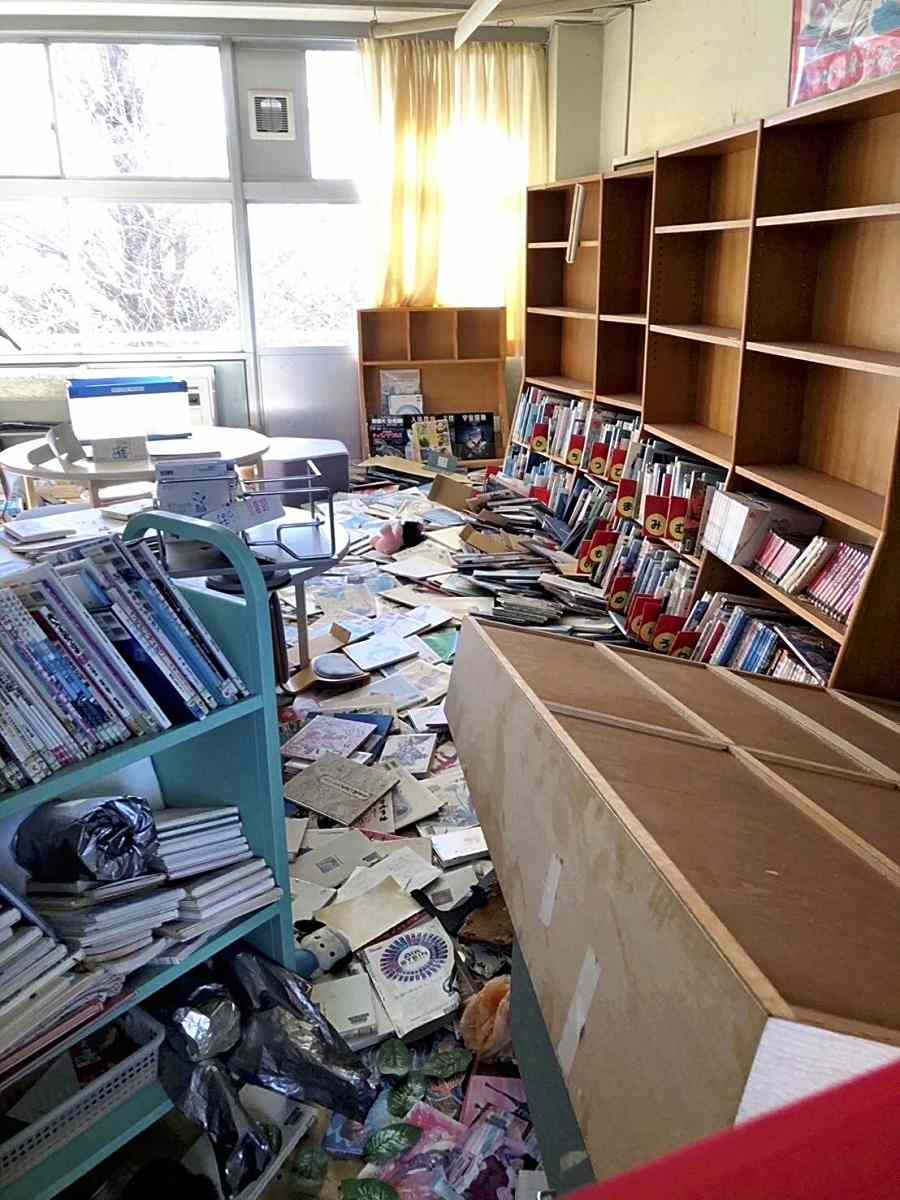
Books in the library at Kumamachi Elementary School in Okuma lie scattered where they fell during the Great East Japan Earthquake, in this photo taken on Feb. 4.
The following day, a hydrogen explosion occurred at the Tokyo Electric Power Company Holdings, Inc. nuclear plant.
Takeuchi left his hometown, unable to return to the school to recover his belongings or even to say goodbye to his close friends. Along with his parents and siblings, he moved around the prefecture, staying in different gymnasiums as evacuees. Although Takeuchi remembers little from that period, he does recall doing his best not to cause any problems for his parents.
After a while, the family moved into a house they rented in Fukushima City. From his junior high days right through university, Takeuchi immersed himself in baseball. He also made new friends there. “I thought I’d give it my best shot in this new environment,” Takeuchi said. “I had no intention of returning to Okuma.”
After graduating from university, Takeuchi landed a job at a company based outside Fukushima Prefecture. He was frequently transferred to branches in Osaka and Nagoya, and his constantly hectic work in a sales position took a toll on his health. Takeuchi took a leave of absence from work and returned to stay with his parents for the first time in 1½ years.
During the time with his family, his worries naturally faded away whenever he found time to relax and read books. A thought popped into his mind: “I wonder if I could make a place where people struggling to get through each day could come and take a breather for a while.” Around the same time, he also began thinking more about the nuclear plant accident and the reconstruction of his hometown. Takeuchi gradually began to feel that he wanted to live and work in Okuma to see a new future for his hometown. He discussed his thoughts with his parents, who told him that they still had the site where his grandmother’s home once stood.
This stirred up memories from his childhood.
After school, Takeuchi would stay at his grandmother’s house about four kilometers from his home until his parents came back from work. There was a small bookshelf near a window in the living room. Takeuchi would pick out books with foreign fairy tales or titles from “The Fiend with Twenty Faces” series by famed mystery novelist Edogawa Rampo, burying his nose in them at his grandmother’s house.
But after the 2011 disaster struck, those happy times disappeared. His grandmother evacuated to Tochigi Prefecture and other areas and passed away at the age of 92 in February 2020. She was unable to return home, and her empty house was later torn down.
Takeuchi felt encouraged by these memories. He left his job and started work at a sheet metal processing company in Fukushima Prefecture in April last year. Since last summer, he spent his spare time visiting the site of his grandmother’s house, cutting grass and making other preparations to launch his stall. He finally opened for business in December.
“I wanted to create a place where people can come and relax,” Takeuchi said, explaining why he chose the name Ikitsugi for his stall.
In front of Ono Station, the construction of a facility that will host various businesses has been underway since last autumn. Despite positive developments such as this, no timeframe has been set for lifting evacuation orders still in place for households in areas designated as difficult-to-return. Takeuchi travels to the stall from his home in the neighboring town of Tomioka.
In February, Takeuchi returned to his old elementary school for the first time in 13 years to retrieve his belongings. Memories of his days at school came flooding back. His desk was in the front row next to the window. He often had borrowed books from the school library. During breaks, he would excitedly play soccer on the field. The school had been frozen in time and remained just as he had remembered it.
Takeuchi’s stall opens only in the evening in this town where the present and past coexist. News of his stall has spread by word of mouth and on social media, attracting all kinds of customers. Residents he has never met before have visited, as well as a police officer on patrol and even people from outside the prefecture. As the evening chill starts to bite, Takeuchi tosses another piece of wood on the fire to keep warm and, with a coffee in one hand, chats about all sorts of things with the customers. Discussions turn to books they have read, the reasons he opened this stall, how the area used to look and even the events of that catastrophic day in 2011. Time passes slowly during another evening in Okuma.
“I’ll keep searching for the answer to the question of what reconstruction really means while watching my home-town’s appearance change,” Takeuchi said. He added he was determined to continue living in Okuma.
Top Articles in Society
-

JAL, ANA Cancel Flights During 3-day Holiday Weekend due to Blizzard
-

Man Infected with Measles May Have Come in Contact with Many People in Tokyo, Went to Store, Restaurant Around When Symptoms Emerged
-

Australian Woman Dies After Mishap on Ski Lift in Nagano Prefecture
-

Record-Breaking Snow Cripples Public Transport in Hokkaido; 7,000 People Stay Overnight at New Chitose Airport
-

Foreign Snowboarder in Serious Condition After Hanging in Midair from Chairlift in Nagano Prefecture
JN ACCESS RANKING
-

Univ. in Japan, Tokyo-Based Startup to Develop Satellite for Disaster Prevention Measures, Bears
-

JAL, ANA Cancel Flights During 3-day Holiday Weekend due to Blizzard
-

Japan Institute to Use Domestic Commercial Optical Lattice Clock to Set Japan Standard Time
-

China Eyes Rare Earth Foothold in Malaysia to Maintain Dominance, Counter Japan, U.S.
-

Japan, Qatar Ministers Agree on Need for Stable Energy Supplies; Motegi, Qatari Prime Minister Al-Thani Affirm Commitment to Cooperation



